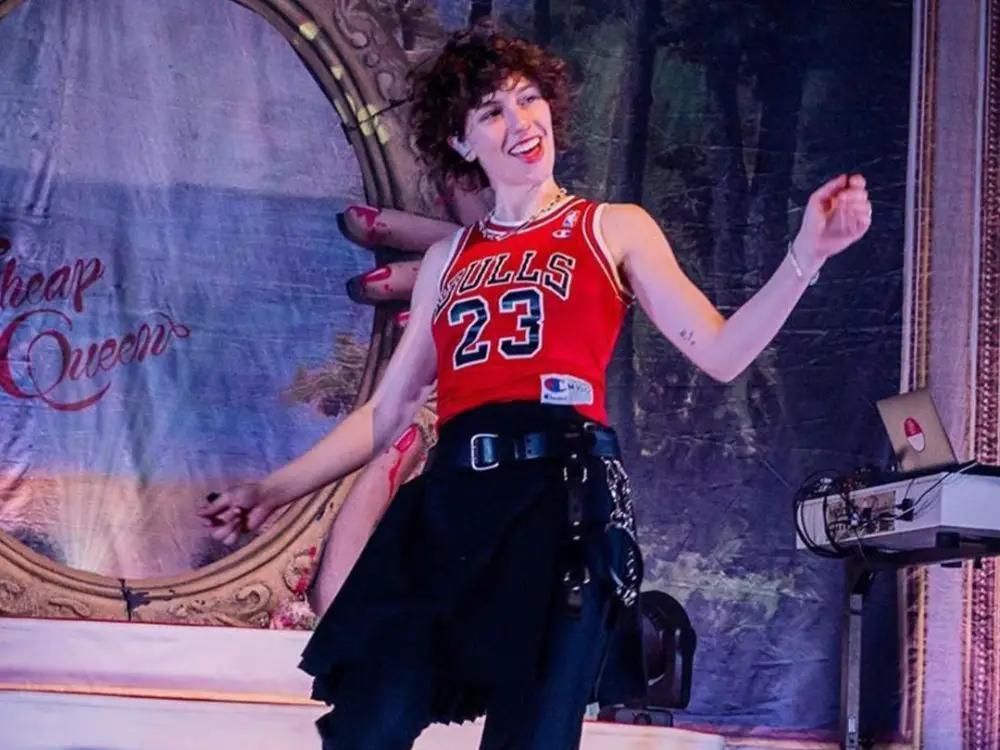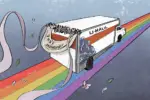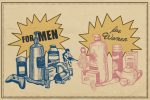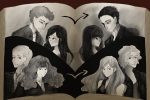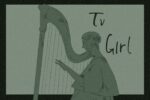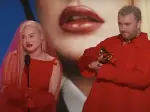“We’re filming a music video tonight, Los Angeles,” said Mikaela Straus, widely known under the stage name King Princess, as she faced a crowd of around 2,000 people at The Wiltern. On Jan. 25, during her second show of the weekend, Straus pulled out all of the stops to bring more energy to an all-time high for the music video.
Coming to the end of her already rowdy and mildly destructive set, the 21-year-old singer made a deal with her audience: If they screamed loud enough throughout her performance, she would flash them by the end of the night.
Brooklyn-born Straus’ music career skyrocketed forward in March 2018, around the time that Harry Styles tweeted the lyrics to the first King Princess single, “1950.” I, along with many others, fell in love with her songwriting skills after the discovery of this lyrically-coded and double entendre love ballad.
“It’s a metaphor,” Straus said in her Genius video. “For the way that queer people have had to hide our love in history, being a parallel to unrequited love … how that looks so similar to the way that people once couldn’t be gay in public.”
On stage at The Wiltern almost 2 years after the release of “1950,” Straus gears up to play the song again. Well aware of what this song has done for her career, Straus admits she’s bored of playing it. “I’m so grateful,” she said, laughing knowingly with her bandmates on stage. “But can we move onto something else?”
Despite the fact that she claimed her resentment toward the song stemmed from pure boredom while on stage, I looked around the diverse audience belting the soft-rock melody along with her and I wondered if Straus felt frustrated at how the song could receive a whole new meaning, a potentially more orthodox one, when taken out of context.
“I hate it when dudes try to chase me,” Straus sings softly on stage at The Wiltern. I, a straight woman, sang these lines with her: “But I love it when you try to save me, because I’m just a lady.” In these opening lines, “the sentiment is pretty sick,” Straus says again in her Genius video, as they feel pretty universal to anyone who has received unwanted male attention.
Adding to this universalizing effect, the “you” in her lyrics marks the song’s intended recipient as ambiguous in regards to their gender. “Tell me why my gods look like you and tell me why it’s wrong,” Straus sings in the song’s post-chorus, introducing a soon-to-be recurring pattern of religious and queer themes in her lyrics, more overtly seen in songs like “Holy” or “Pussy Is God.”
https://www.instagram.com/p/B74QtMaJvCq/?utm_source=ig_web_copy_link
Straus said that she just wants all people “gay, straight, whatever the f–k” to listen to her music and make their own meaning. I assumed on first listen of “1950” that Straus was queer and singing of a same-sex relationship. Several of my friends, who are fans of hers as well, did not realize as much, assuming after hearing the song on mainstream media or radio platforms that she was singing of any form of unrequited love.
This initial confusion, I think, allowed Straus to “trojan horse” popular music, whether she intended to do as such or not. Upon first listen of her debut single, with little to no context on her background, one could assume two things: that Straus only created more conventional pop music and that she was straight. The latter may result, in part, from the overbearing heteronormativity in today’s popular music, or from the double meaning and the vague wording of Straus’ lyrics.
But at The Wiltern on that Saturday night, anyone who believed Straus to be either conformist or heterosexual would have been quickly proven wrong. “Angry lesbian!” she shouted at someone from the audience who called her hot. In between her set and her opening act, Los Angeles resident and drag queen Symone came out on stage and did a number, revealing their backside multiple times to the crowd.
While the Straus’ band members were re-tuning their instruments, she had everyone in the audience repeat a prayer to the “fallen gods of rock ‘n’ roll.” When she was trying to remember the name of a fan in the front row, she admitted: “I promise I’m not bad with names, I’m just stoned. And a little drunk.”
https://www.instagram.com/p/B7wXg3mJl94/?utm_source=ig_web_copy_link
During the encore, the grand finale of Straus’ unreleased tune “Ohio,” the singer performed all of her guitar solos on the stage floor — spinning in circles on her back, thrusting her hips toward the air and rolling over on her side to sing her parts. During the song’s crescendo, she smashed her Fender guitar through the drum set, on which the drummer kept banging.
Then she smashed her guitar in half on the ground, which is when the people in front of me, who may have been “trojan horse’d,” left. They missed the ending, unfortunately, because Straus then lifted her top for the whole audience to see. “Goodnight Los Angeles, you b—h.”


